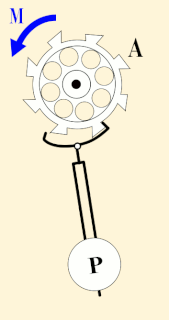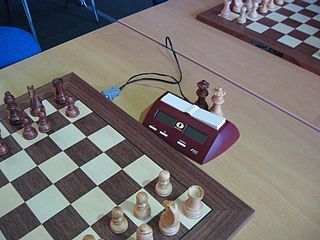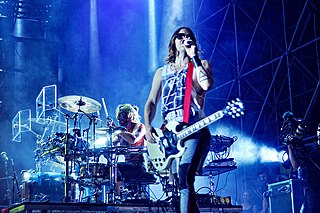
A day, a unit of time, is approximately the period of time during which the Earth completes one rotation around its axis with respect to the Sun. In 1960, the second was redefined in terms of the orbital motion of the Earth in year 1900, and was designated the SI base unit of time. The unit of measurement "day", was redefined as 86 400 SI seconds and symbolized d. In 1967, the second and so the day were redefined by atomic electron transition. A civil day is usually 86 400 seconds, plus or minus a possible leap second in Coordinated Universal Time (UTC), and occasionally plus or minus an hour in those locations that change from or to daylight saving time.
The joule is a derived unit of energy in the International System of Units. It is equal to the energy transferred to an object when a force of one newton acts on that object in the direction of its motion through a distance of one metre. It is also the energy dissipated as heat when an electric current of one ampere passes through a resistance of one ohm for one second. It is named after the English physicist James Prescott Joule (1818–1889).

A leap second is a one-second adjustment that is occasionally applied to civil time Coordinated Universal Time (UTC) to keep it close to the mean solar time at Greenwich, in spite of the Earth's rotation slowdown and irregularities. UTC was introduced on January 1, 1972, initially with a 10 second lag behind International Atomic Time (TAI). Since that date, 27 leap seconds have been inserted, the most recent on December 31, 2016 at 23:59:60 UTC, so in 2018, UTC lags behind TAI by an offset of 37 seconds.

The second is the base unit of time in the International System of Units (SI), commonly understood and historically defined as 1⁄86400 of a day – this factor derived from the division of the day first into 24 hours, then to 60 minutes and finally to 60 seconds each. Mechanical and electric clocks and watches usually have a face with 60 tickmarks representing seconds and minutes, traversed by a second hand and minute hand. Digital clocks and watches often have a two-digit counter that cycles through seconds. The second is also part of several other units of measurement like meters per second for velocity, meters per second per second for acceleration, and per second for frequency.

A time control is a mechanism in the tournament play of almost all two-player board games so that each round of the match can finish in a timely way and the tournament can proceed. Time controls are typically enforced by means of a game clock, where the times below are given per player. Time pressure is the situation of having very little time on a player's clock to complete their remaining moves.

The Year 2038 problem relates to representing time in many digital systems as the number of seconds passed since 1 January 1970 and storing it as a signed 32-bit binary integer. Such implementations cannot encode times after 03:14:07 UTC on 19 January 2038. Just like the Y2K problem, the Year 2038 problem is caused by insufficient capacity of the chosen storage unit.

Jared Joseph Leto is an American actor, singer, songwriter, and director. After starting his career with television appearances in the early 1990s, Leto achieved recognition for his role as Jordan Catalano on the television series My So-Called Life (1994). He made his film debut in How to Make an American Quilt (1995) and received critical praise for his performance in Prefontaine (1997). Leto played supporting roles in The Thin Red Line (1998), Fight Club (1999) and American Psycho (2000), as well as the lead role in Urban Legend (1998), and earned critical acclaim after portraying heroin addict Harry Goldfarb in Requiem for a Dream (2000). He later began focusing increasingly on his music career, returning to acting with Panic Room (2002), Alexander (2004), Lord of War (2005), Lonely Hearts (2006), Chapter 27 (2007), and Mr. Nobody (2009). In 2012, he directed the documentary film Artifact. He then appeared in Suicide Squad (2016) and Blade Runner 2049 (2017).

The Porsche Carrera GT is a mid-engine sports car that was manufactured by German automobile manufacturer Porsche between 2004–2007. Sports Car International named the Carrera GT number one on its list of Top Sports Cars of the 2000s, and number eight on Top Sports Cars of All Time list. For its advanced technology and development of its chassis, Popular Science magazine granted the "Best of What's New" award in 2003.

In astronomy, the rotation period of a celestial object is the time that it takes to complete one revolution around its axis of rotation relative to the background stars. It differs from the planet's solar day, which includes an extra fractional rotation needed to accommodate the portion of the planet's orbital period during one day.

Thirty Seconds to Mars is an American rock band from Los Angeles, California, formed in 1998. The band consists of brothers Jared Leto and Shannon Leto. During the course of its existence, it has undergone various line-up changes.
The 40-yard dash is a sprint covering 40 yards (36.58 m). It is primarily run to evaluate the speed and acceleration of American football players by scouts, particularly for the NFL Draft but also for collegiate recruiting. A player's recorded time can have a heavy impact on his prospects in college or professional football. This was traditionally only true for the "skill" positions such as running back, wide receiver, and defensive back, although now a fast 40-yard dash time is considered important for almost every position. The 40-yard dash is not an official race in track and field athletics and is not an IAAF-recognized race.

The 100 metres hurdles, or 100-meter hurdles, is a track and field event run mainly by women. For the race, ten hurdles of a height of 83.8 centimetres (33.0 in) are placed along a straight course of 100 metres (109.36 yd). The first hurdle is placed after a run-up of 13 metres from the starting line. The next 9 hurdles are set at a distance of 8.5 metres from each other, and the home stretch from the last hurdle to the finish line is 10.5 metres long. The hurdles are set up so that they will fall over if bumped into by the runner, but weighted so this is disadvantageous. Fallen hurdles do not count against runners provided that they do not run into them on purpose. Like the 100 metres sprint, the 100 m hurdles begins with athletes in starting blocks.

Earth's rotation is the rotation of Planet Earth around its own axis. Earth rotates eastward, in prograde motion. As viewed from the north pole star Polaris, Earth turns counter clockwise.

Usain St Leo Bolt is a Jamaican retired sprinter. He also is a world record holder in the 100 metres, 200 metres and 4 × 100 metres relay. His reign as Olympic Games champion in all of these events spans three Olympics. Owing to his achievements and dominance in sprint competition, he is widely considered to be the greatest sprinter of all time.

Trinidad and Tobago sent a delegation to compete at the 2008 Summer Olympics in Beijing, China. Its participation in the Beijing games marked its eighteenth Olympic appearance and fifteenth Summer Olympic appearance since its debut at the 1948 Summer Olympics in London, excluding its joint participation with Jamaica and Barbados in 1960 as the West Indies Federation. With 28 athletes, more Trinidadians had competed at the Olympics than in any other single Olympic games in its history before Beijing. Athletes representing Trinidad and Tobago advanced past the preliminary or qualification rounds in twelve events and reached the final rounds in four of those events. Of those four events, silver medals were won in the men's 100 meters and in the men's 4x100 meters relay. The latter can be upgraded to gold due to one member of the quartet that crossed the line first, Nesta Carter, tested positive for a banned substance. The nation's flag bearer at the opening ceremony that year was swimmer and Athens medalist George Bovell.
The 10-second barrier is a term used in track and field athletics, which refers to the physical and psychological barrier of completing the men's 100 metres sprint in under ten seconds. The achievement was traditionally regarded as the hallmark of a world-class sprinter. The 10 second barrier tends to be the crown jewel of the sport.

Coordinated Universal Time is the primary time standard by which the world regulates clocks and time. It is within about 1 second of mean solar time at 0° longitude, and is not adjusted for daylight saving time. In some countries where English is spoken, the term Greenwich Mean Time (GMT) is often used as a synonym for UTC and predates UTC by nearly 300 years.

5 Seconds of Summer, often shortened to 5SOS, are an Australian pop rock band from Sydney, New South Wales, formed in 2011. The group consists of lead vocalist and rhythm guitarist Luke Hemmings, lead guitarist Michael Clifford, bassist Calum Hood, and drummer Ashton Irwin. They were originally YouTube celebrities, posting videos of themselves covering songs from various artists during 2011 and early 2012. They rose to international fame while touring with English-Irish band One Direction on their Take Me Home Tour. They have since released three studio albums and headlined three world tours.
80 metres hurdles is a distance in hurdling ran by women until 1972 in international competitions.

"FourFiveSeconds" is a song recorded by Bajan/Guyanese singer Rihanna, American musician Kanye West, and English musician and former Beatles member Paul McCartney. It was written and produced by West, McCartney, Mike Dean, Dave Longstreth and Noah Goldstein with additional writing from Kirby Lauryen, Ty Dolla Sign, Dallas Austin, Elon Rutberg and Rihanna. Previewed by West at the iHeartMedia Music Summit on January 21, 2015, it was posted on Rihanna's official website on January 24. The same day the song was made available for digital download. "FourFiveSeconds" is a folk-pop, pop, pop rock and soul pop song with an instrumentation consisting of an acoustic guitar, organ and bass guitar. Vocals are mainly by Rihanna, with significant vocal portions of the song performed by West. McCartney is featured on the track as a musician, but does not sing any lead vocal part.

















